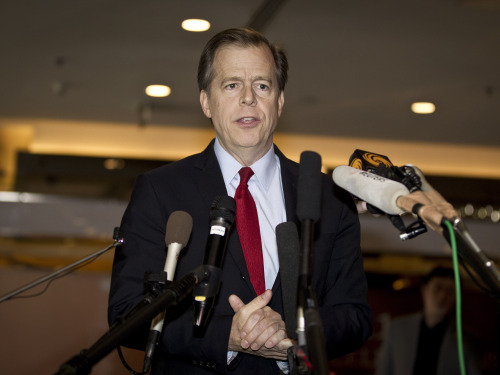North Korean nuclear talks could be resumed earlier than expected: experts
Just hours before the announcement of North Korean leader Kim Jong-il’s death, Washington and Pyongyang had nearly reached an agreement on U.S. aid for the famine-stricken state in exchange for North Korea’s suspension of its nuclear program.
AP reported on Sunday that the U.S. would hold a bilateral talk soon with North Korea to discuss providing 20,000 tons of nutritional assistance per month for a year, to push North Korea to halt its controversial uranium enrichment program. It was a preliminary step for a resumption of six-party nuclear talks involving the two Koreas, the U.S., Russia, China and Japan, which stalled in late 2008.
However, with the demise of the top decision maker, the bilateral talks ― scheduled in Beijing between Glyn Davies, the U.S. Special Representative for North Korea policy, and Kim Kye-gwan, First Vice Minister of the Ministry of Foreign Affairs of the North ― have been delayed indefinitely.
Just hours before the announcement of North Korean leader Kim Jong-il’s death, Washington and Pyongyang had nearly reached an agreement on U.S. aid for the famine-stricken state in exchange for North Korea’s suspension of its nuclear program.
AP reported on Sunday that the U.S. would hold a bilateral talk soon with North Korea to discuss providing 20,000 tons of nutritional assistance per month for a year, to push North Korea to halt its controversial uranium enrichment program. It was a preliminary step for a resumption of six-party nuclear talks involving the two Koreas, the U.S., Russia, China and Japan, which stalled in late 2008.
However, with the demise of the top decision maker, the bilateral talks ― scheduled in Beijing between Glyn Davies, the U.S. Special Representative for North Korea policy, and Kim Kye-gwan, First Vice Minister of the Ministry of Foreign Affairs of the North ― have been delayed indefinitely.

However, experts noted that the resumption of the six-party talks could occur earlier than expected, citing the 1994 Agreed Framework signed in Geneva between the U.S. and North Korea ― three months after the death of then-leader and Kim Jong-il’s father Kim Il-sung. The agreement was designed to limit the threat from the North’s nuclear facilities in exchange for multinational energy aid for the North.
“We will have to watch North Korea for about one or two months after Kim’s funeral. But the U.S. is not likely to take much time in engaging in a dialogue with North Korea,” Yang Moo-jin, a North Korean expert at South Korea’s University of North Korean Studies, told The Korea Herald.
“Heir apparent Kim Jong-un may complete the unfinished Washington-Pyongyang talks to announce the year 2012 as the initial year of a power state,” he said.
After a bilateral talk between the U.S. and North Korea, China is expected to show its willingness to resume six-party talks as the chair of the talks, he added.
Jeong Se-hyun, former unification minister and president of Wonkwang University, said regional powers including the U.S. will be able to more easily persuade the North to come back to the table because the North is in a dire situation because of famine and the failure of its currency reform.
“If outsiders allow North Korea to break free from economic and diplomatic isolation, it will be easily persuaded. Then, six-party talks could resume earlier than expected,” Jeong told a radio program on Tuesday morning.
Japanese Prime Minister Yoshihiko Noda and U.S. President Barack Obama had discussed the resumption of the six-party talks, said Japan’s chief cabinet secretary Osamu Fujimura on Tuesday.
Fujimura told reporters in Tokyo that Japan wants to hold a high-level meeting among Japan, the U.S. and South Korea first, “as early as possible.”
Korea’s Foreign Minister Kim Sung-hwan and U.S. Secretary of State Hillary Clinton spoke on the phone on Monday evening, Seoul time, and shared the view that it was important for the two allies to “speak in the same voice.”
Regarding U.S. aid to North Korea, State Department spokesperson Victoria Nuland told reporters in Washington on Monday, “No decisions have been made about whether to provide food aid, about what the amounts might be, or about what the types of nutritional assistance might be.”
By Kim Yoon-mi (yoonmi@heraldcorp.com)
-
Articles by Korea Herald


![[AtoZ into Korean mind] Humor in Korea: Navigating the line between what's funny and not](http://res.heraldm.com/phpwas/restmb_idxmake.php?idx=644&simg=/content/image/2024/04/22/20240422050642_0.jpg&u=)
![[Exclusive] Korean military set to ban iPhones over 'security' concerns](http://res.heraldm.com/phpwas/restmb_idxmake.php?idx=644&simg=/content/image/2024/04/23/20240423050599_0.jpg&u=20240423183955)



![[Graphic News] 77% of young Koreans still financially dependent](http://res.heraldm.com/phpwas/restmb_idxmake.php?idx=644&simg=/content/image/2024/04/22/20240422050762_0.gif&u=)
![[Herald Interview] Why Toss invited hackers to penetrate its system](http://res.heraldm.com/phpwas/restmb_idxmake.php?idx=644&simg=/content/image/2024/04/22/20240422050569_0.jpg&u=20240422150649)






![[Exclusive] Korean military to ban iPhones over security issues](http://res.heraldm.com/phpwas/restmb_idxmake.php?idx=652&simg=/content/image/2024/04/23/20240423050599_0.jpg&u=20240423183955)



![[Today’s K-pop] Ateez confirms US tour details](http://res.heraldm.com/phpwas/restmb_idxmake.php?idx=642&simg=/content/image/2024/04/23/20240423050700_0.jpg&u=)